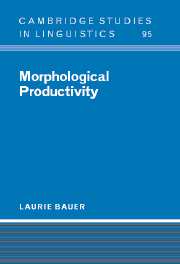4 - Psycholinguistic evidence about productivity
Published online by Cambridge University Press: 22 September 2009
Summary
Why is it one of the deep-set beliefs in memory research that the ideal to reach for is to store as much information as possible by using as little space as possible? … The point, of course, is not that this basic scientific research method is misguided, but that it may be dangerous to speculate that the human learner is designed to ‘summarise’ information in the same way as the scientist.
Sandra (1994: 247)Introduction
Psycholinguists are interested in morphological aspects of language behaviour because of the information that can be gleaned from it about the way in which language is processed, stored and produced. Much of the research that has been done in this area has been carried out from the point of view of research into reading, attempting to discover how readers link the text to their own linguistic competences, for instance. However, not all of this research is relevant for the purposes of this book. Here I review only two of these three aspects: storage and production.
The reasoning behind this is as follows. The comprehension of language in its written form may be complicated by different strategies of dealing with the complexities of orthographic structure that have nothing to do with the way in which meaningful units are stored in the brain. The same is true of phonological structure in dealing with the comprehension of spoken language.
- Type
- Chapter
- Information
- Morphological Productivity , pp. 100 - 124Publisher: Cambridge University PressPrint publication year: 2001



